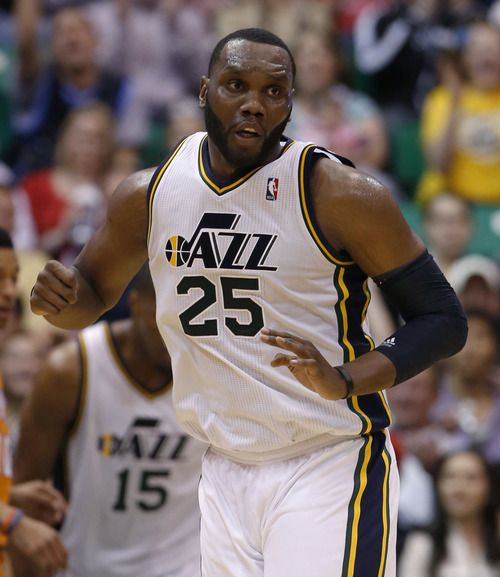This is an archived article that was published on sltrib.com in 2013, and information in the article may be outdated. It is provided only for personal research purposes and may not be reprinted.
There's a lot of hubbub these days out here in the West. Everyone's breaking down the race for the No. 8 seed in the conference, comparing remaining strength of schedules and going geek mode on statistical models for which team will make the playoffs, as though it were for something bigger than the privilege of getting rolled in the first round by San Antonio or Oklahoma City. That's because the Lakers, who have been thoroughly underwhelming, are in the chase along with the Jazz and Mavericks. What the Lakers do is always news, and Kobe did guarantee a spot in the playoffs, after all.
Coverage in Utah is similarly breathy, suggesting that all here edge up on their seats in anticipation of the Jazz getting in. The players supposedly are mustering everything they've got for the last run.
But the dumb question of the day is: For what?
No, really. Not being disingenuous here. Winning obviously is better than losing. But is it so all-fired important for the Jazz to make the playoffs at the bottom of the bracket when they're poorly suited to compete against the top? Isn't it a little like being the ugliest princess at the ball? You get invited, you put on the slippers, the lipstick and the gown, but you can't hide the truth. You can't wear a grocery bag over your head.
You want to win, but you're going to lose.
And you might get embarrassed.
It's like when Frank Layden was asked about his invitation to speak at Harvard's Law School. He said: "It was awful. Everybody knew I was the dumbest one in the room."
Is being the worst of the best that much better than being the best of the worst, especially when the latter could bump your position in the draft up a few notches?
Last postseason, the Jazz strained to barely get in, and what did it bring them? A punch in the mouth. The standard line about the uninitiated needing a taste of the playoffs before progressing in them — "It's important for young players to get that experience," said Derrick Favors — may be true in a general sense. But what exactly did the Jazz gain from last year's Spurs sweep?
Now, if the Jazz scratch and claw, they'll be right back in the same position.
So … does it really matter?
The veteran players say it does.
"It's the first step of many," said Al Jefferson. "You make the playoffs, then you advance in the playoffs. You try to fight for the goal. We have the talent here to be a playoff team. Anything less would be a disappointment. You got to get to the point where you know what it takes to make it and then you advance. We're getting there."
Said Earl Watson: "Losing is contagious, winning is contagious. You want to stay consistent with the positives, not the negatives. We can't live off of John Stockton and Karl Malone. We have to build our own culture. It's always a step-by-step process. Some franchises don't have that culture. Here, there's a tradition."
"You look at the history of the Jazz," Jefferson said. "They've always been a playoff team. We don't want to start now not being one. It's a matter of pride. And it's not just us. It's the fans. We got the whole city riding on us."
Both Jefferson and Watson, though, are doing business somewhere between encouragement and disappointment.
"Fighting to make the playoffs is nowhere near where this team wants to be," Watson said. "We should be fighting to win the Western Conference. You don't want to be an eighth seed. That's the reality, but it's time to take the next step."
Financially, the Jazz benefit by qualifying for the postseason to the tune of some $500,000 per home game. That number escalates after the first round, if the Jazz could once again get that far.
But the economic impact on the club blows beyond that. "It sends a message to our fans and sponsors that we're a competitive team," said Jazz president Randy Rigby. "It makes fans want to keep coming back and buying tickets. It makes them say, 'Hey, I want to be a part of this.' That makes a significant difference. So, it helps us financially and it helps us competitively. It helps our players develop.
"It's not the end of the world if we don't make the playoffs. But if we do, things sometimes happen, injuries happen, upsets happen. You never know."
We kind of do know, in this case.
No. 8 seeds have taken out No. 1s five times. It's occurred three times since first-round series were expanded to a best-of-seven format. But for the Jazz to do that this year, if they do make the postseason, it would take something bordered on one side by the bizarre and on the other by the extraordinary.
"All we can do is work and fight every night," Jefferson said. "That's all we can do."
GORDON MONSON hosts "The Big Show" with Spence Checketts weekdays from 3-7 p.m. on 97.5 FM, 1280 and 960 AM The Zone. Twitter: @GordonMonson.



